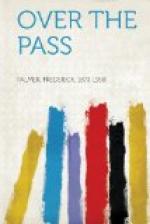But there were certain persons whom he must inform of the crossing. First, he wrote a telegram to Jim Galway: “Sorry, but overwhelming duty here will not permit. Luck and my prayers with you.” Then to Firio a letter, which did not come quite so easily: “You see by now that you are mistaken, Firio. I am not coming back. Make the most of the ranch—your ranch—that you can.” The brevity, he told himself, was in keeping with Firio’s own style. Besides, anything more at length would have opened up an avenue of recollections which properly belonged to oblivion.
And Mary? Yes, he would write to her, too. He would cut the last strand with the West. That was best. That was the part of his new courage of self-denial stripping itself of every trammeling association of sentiment. Other men had given up the women of their choice; and he could never be the man of this woman’s choice. Somehow, his father’s talk had made him realize an inevitable outcome which had better be met and mastered in present fortitude, rather than after prolonged years of fruitless hope centering two thousand miles away. He started a dozen letters to Mary, meaning each to be a fitting envoi to their comradeship and a song of good wishes. Each one he wrote in the haste of having the task quickly over, only to throw away what he had written when he read it. The touch that he wanted would not come. He was simply flashing out a few of a thousand disconnected thoughts that ran away incoherently with his pen.
But wasn’t any letter, any communication of any kind, superfluous? Wasn’t it the folly of weak and stupid stubbornness? She had spoken her final word in their relations at the hotel door. There was no Little Rivers; there was no Mary; there was nothing but the store. To enforce this fiat he had only to send the wire to Jim and post the letter to Firio. This he would do himself. A stroll would give him fresh air. It was just what he needed after all he had been through that evening; and he would see the streets not with any memory of the old restlessness when he and his father were strangers, but kindly, as the symbol of the future.
His room was on the second floor. As he left it, he heard the door-bell ring, its electric titter very clear in the silence of the house. No doubt it meant a telegram for his father. At the turn of the stairs on the first floor he saw the back of the butler before the open door. Evidently it was not a matter of a telegram, but of some late caller. Jack paused in the darkness of the landing, partly to avoid the bother of having to meet anyone and partly arrested by the manner of the butler, who seemed to be startled and in doubt about admitting a stranger at that hour. Indistinctly, Jack could hear the caller’s voice. The tone was familiar in a peculiar quality, which he tried to associate with a voice that he had heard frequently. The butler, apparently satisfied with the caller’s appearance, or, at least, with his own ability to take care of a single intruder, stepped back, with a word to come in. Then, out of the obscurity of the vestibule, appeared the pale face of John Prather. Jack withdrew farther into the shadows instinctively, as if he had seen a ghost; as if, indeed, he were in fear of ghosts.




